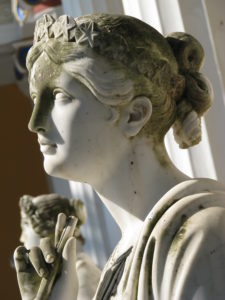A Muse You Can Use
 Many writers report that it is easy to be swayed by doubt, causing them to abandon the pursuit and give up. Following the initial excitement of embarking on a new quest, we can end up in a space of uncertainty. I experienced this when I was writing my dissertation. What many do not understand is that it can be a natural stage in the writing process. John Keats, a Romantic poet, referred to this as the need to tolerate negative capability.
Many writers report that it is easy to be swayed by doubt, causing them to abandon the pursuit and give up. Following the initial excitement of embarking on a new quest, we can end up in a space of uncertainty. I experienced this when I was writing my dissertation. What many do not understand is that it can be a natural stage in the writing process. John Keats, a Romantic poet, referred to this as the need to tolerate negative capability.
By this he meant being able to stay with our work even when we do not necessarily know where it is going. The irony is that the uncertainty of not knowing where we are going and staying with it anyway requires having trust in the process.
Keats explained negative capability as those times “when a man is capable of being in uncertainties, mysteries, doubts, without any irritable reaching after fact and reason.” 1 In tat sense, the creative process requires character. On that has a process to guide us and help tolerate the negative emotions. It remains hopeful without giving up. It offers a creative way to handle doubt.
Creativity
The creative process is a spiral of excitement and disillusionment. It is filled with elation and self-doubt that we need to learn how to tolerate and navigate so that we can stay the course. We must trust the power of imagination that works behind the scenes. Creating and bringing forth our stories includes developing, shaping and recombining. Conversely, it is also about destruction, letting go and persevering, all of which can be transformative.
What allowed me to go from mental block to breakthrough was having faith or trust in the process. I did not give up and did not try to force it. Often, all I had to do was ask myself before I went to sleep for an answer to come in a dream. Sometimes it came in a daydream or even when I first woke up. I would go for a walk, or take a shower. Then oftentimes the answer I was looking for, in how the story should unfold, would just be there. So long as I did not give up and I kept trusting in my muse.
History of the Muse
 The notion of a muse or genius (the Roman denotations for the Greek idea of a daimon – also spelled daemon), was used to explain the elusive notion of inspiration. Daimons are long associated with the force that propels creativity. Daimons, according to Socrates’ teacher Diotima, were considered to be beings halfway between humans and gods. They served the function of what Noel Cobb referred to as “faithful translators and go-betweens, mediating and intermediate.”2
The notion of a muse or genius (the Roman denotations for the Greek idea of a daimon – also spelled daemon), was used to explain the elusive notion of inspiration. Daimons are long associated with the force that propels creativity. Daimons, according to Socrates’ teacher Diotima, were considered to be beings halfway between humans and gods. They served the function of what Noel Cobb referred to as “faithful translators and go-betweens, mediating and intermediate.”2
Daimon Dynamics
Joseph Campbell explained that a god is a “personification of a motivating power or a value system that functions in human life.”3 That also describes the function of a daimon. In this case the motivating power can be seen as the one that guides or creates the magic behind the scenes that we experience as part of the creative process. What we see is that daimons can be both the source of creativity and also a certain kind of happiness or unhappiness that emerges from having or not having a relationship with one.
Most would agree that the notion of a genius or daimon has lost its original meaning, which makes its definition more confusing. Walter Burkett who wrote, Greek Religion, had a cool interpretation. He says a daimon “designates a mode of activity… occult power, a force that drives man forward where no agent can be named. The individual feels as it were that the tide is with him, he acts with the daimon… or else when everything turns against him he stands against the daimon.”4
The Meaning
In other words, a daimon can be seen as a driving power, or force, that acts behind the scenes, much as imagination and inspiration do. The question then becomes: What if this generative power is something to which we all have access? And, if so, then the question becomes: How do we learn how to access it? I think what we can view it as being synonymous with, or accompanying, the creative process.
That would explain the illumination stage that creative people know so well. The inspiration just shows up as a thought that pops into your head just when you need it. What we have to do is to learn how to understand and trust the process. Let me know how you would describe your muse.
_______________________________
- John, Keats, The Complete Poetical Works and Letters of John Keats (Boston, MA: Houghton Mifflin, 1899) 2
- Noel Cobb, Archetypal Imagination: Glimpses of the Gods in Life and Art, (Hudson, NY: Lindisfarne Press, 1992). 130
- Joseph Campbell & Bill Moyers, The Power of Myth (New York, NY: Doubleday, 1988). 28
- Walter Burkett, Greek Religion (Cambridge, MA: Harvard University Press). 180

